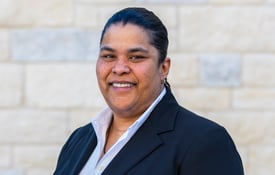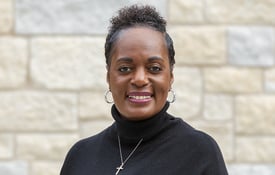HHS Afro Connect Provides a Place for Voices to be Heard
In August 2022, HHS launched its first three Employee Resource Groups (ERGs), called OneHHS Connect Groups, as part of its Diversity, Equity, and Inclusion initiatives. These groups provide a safe, supportive space for employees who share a common identity, or for those who want to support their colleagues as allies. One of those groups is Afro Connect which exists to support the interest of HHS team members who identify as Black or African American.
In the last several months, Afro Connect, led by Co-Chairs Marta Hernandez and Tameka Harmon and Secretary Tracy Ann Mitchell, has established a mission and a monthly groove, built community, and planned content and a presentation to celebrate Black History Month. The group has used their meetings to cover topics from effective communication to self-care and self-development as well as encourage their members to give back to their communities.


.jpg?width=275&height=175&name=team%20member%20stories_Tracy%20Ann%20Mitchell_0000_20200807_123033%20-%20Tracy%20Ann%20Mitchell%20(3).jpg)
Marta and Tameka both expressed that they wish for Afro Connect to be a place where team members can make their voices heard.
“I hope that [team members can] find a place, a home, you know, within the company. I hope that it brings them opportunity, just knowing that there's a platform for their voices to be heard, to express how they feel. And that they know they have opportunities for growth within a company that cares [about]… what they feel and what they need,” Marta shared.
Different and the Same
That desire for voices to be heard is apparent in Afro Connect’s mission which is “to provide an encouraging atmosphere for Black and African-American leaders where differences are celebrated, ideas recognized and contributions acknowledged. We will work together to ensure that the power of each individual makes a difference to the collective conscience of our workplace through thoughtful exchange and understanding."
There’s also a sense of the importance of common ground that comes through when Marta and Tameka talk about their vision for Afro Connect. Marta explained, “While we embrace our differences and own who we are and educate folks about who we are… I think it’s also really important that we understand we are all part of the human race. Many of our experiences are very similar. We [all] want better for ourselves and our families, we love our children, and we value kindness. There’s a lot of things that bring us together.”
Tameka expanded, saying, “We all are one race and we should treat each other as we want to be treated. But in the real world, that's not happening. If you look within us, we all have brains, and feelings, and emotions; we all go through things. With HHS, in recognizing other people's views and their backgrounds and just [giving] a voice, my hope is that this would evolve into bigger things and I really feel that it will [bring more] togetherness.”
Celebrating Black Culture
One thing that comes naturally to both Marta and Tameka is talking about all the aspects of their culture that they love.
Marta describes her culture as a mixture of Hispanic and Afro-Caribbean cultures where, “if somebody dies, you eat. If somebody gets married, you eat. If somebody is born, you eat. And if you bring six friends, they’re all gonna eat as well. You know, it’s food-centric. That’s the beauty of it. It’s their way of extending to you their love and appreciation.”
Tameka comes from a large family and said, “the one thing I grew up experiencing was the connection. Soon as you walk into the house, it was the hug, you had to hug. And the first thing they ask you is, ‘Are you hungry?’ If you turn them down, you say no, it was offensive!”
The conversation quickly moved from food and family to the pieces of African-American culture that have been central to both survival and success for Black people in the U.S.
“The other thing I really appreciate about our culture is the resilience. The refusal to say no and accept less [than]. We’re working hard to make things better for our children and their lives, chasing that American Dream that is so elusive for some of us. I think that’s what I appreciate most,” Marta says.
Tameka reflected on some of the challenges of Black history in the United States, saying, “They looked forward to a better day, even if that day didn’t come, they kept looking for those days. To me, that was Black resilience: you didn’t give in to what was happening to you. The majority of Black people overcame those obstacles [with that] resilience.”
Future Impact
For Black History Month, Afro-Connect gave an educational presentation during their monthly meeting, inviting managers company-wide to join. In the future, they are hoping to continue to expand their impact by growing the group, working with other OneHHS Connect Groups, and partnering with charitable causes that impact the Black community.

